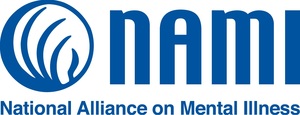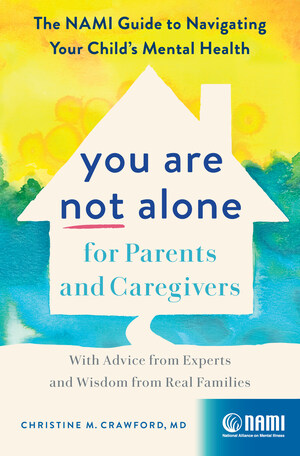More than 3 in 4 believe that improvement is needed in emergency response to a mental health or suicide crisis — both nationally and in their state or area
ARLINGTON, Va., June 16, 2022 /PRNewswire/ -- With only 30 days before 988, the new three-digit number for mental health and suicide crises, is available nationwide, a new poll from the National Alliance on Mental Illness (NAMI) finds that people are still largely unaware that this potentially lifesaving resource is on its way. However, while 988 awareness among the public may be low, Americans overwhelmingly favor policies to help build a robust mental health crisis response system that supports people who dial the new number.
Building on data from NAMI's fall 2021 survey on the same topic, this NAMI-Ipsos poll helps highlight the continued need for widespread education about what 988 will and won't do when it is available on July 16. It also underscores public support for policies that shift from a largely law enforcement response to people in a mental health crisis toward building a system that ensures people in crisis receive a mental health response.
"When 988 is available next month, it will be a tremendous resource for people in crisis and their families. But 988 also provides us with a once-in-a-generation opportunity to reimagine the way our communities respond to mental health and suicide crises," said Daniel H. Gillison Jr., CEO of NAMI. "These findings further strengthen our resolve to raise visibility about the upcoming launch of 988 and advocate for meaningful change to ensure everyone in crisis gets the help they need — not handcuffs."
While the federal government along with community stakeholders have made significant progress in improving crisis services in preparation for 988, the heightened attention has not yet translated into more public awareness. About three-quarters of U.S. adults (77%) still have never heard of 988 — virtually unchanged since October 2021 — and the number who are at least somewhat familiar has not increased over that same period (4% in both polls). The remaining percentage of Americans say that they are not familiar with 988 or that they have heard of it and that's it.
While 988 itself is largely unknown to U.S. adults, people overwhelmingly support focusing on mental health resources for people in crisis. More than 4 in 5 adults (86%) believe that when someone is in a mental health or suicide crisis, they should receive a mental health response — not a police response. Along those lines, 85% of Black Americans say they would be afraid the police may hurt their loved ones or themselves while responding to a mental health crisis, an 11-point increase since 2021, and a number that is 21 percentage points higher than the general population (64%). Accordingly, they support key pieces that make up a robust crisis response system, such as creating 24/7 crisis call centers (91%) and sending mental health professionals to respond in person to crises (87%). They also agree that there must be an alternative to going to an emergency room during a mental health crisis (89%).
This new poll also finds most U.S. adults agree that we need to improve mental health crisis responses for specific communities that have been traditionally marginalized by our mental health system. In particular, respondents agree that crisis responses must be improved for people experiencing homelessness (83%), people with low incomes (82%), young people (79%), people of color (73%) and LGBTQ people (69%). Additionally, 86% of people agree that connecting with peers who have had a similar experience is important for people in crisis.
Improving and building these vital services will require a significant investment by state and federal governments. More than 4 in 5 people support state funding (85%) and federal funding (83%) for 988 call center operations and related crisis response services, with 79% agreeing that more federal funding is needed to support mental health crisis services. Furthermore, 88% of Americans support requiring all health insurers to cover mental health crisis services. Despite months of state-based campaigns against monthly fees on phone bills intended to fund 988 operations and services, nearly three-quarters of respondents are willing to pay some amount on their monthly phone bills to sustainably fund their state's crisis system, similar to how 911 is funded today.
Mental health remains an overwhelmingly agreed-upon issue during an era defined by disagreement. More than three-quarters (77%) of U.S. adults are not content with the status of mental health treatment in this country. About 9 in 10 Americans agree that everyone, regardless of location or income, deserves access to quality mental health care (91%) and mental health crisis response (89%) — support that goes beyond political party, geography, income, race/ethnicity and age – and 88% agree that society would be improved if everyone who needed mental health care was able to access it.
NAMI and its #ReimagineCrisis partner organizations — consisting of more than 40 diverse groups — are continually raising awareness of 988 and the improvements still needed to the larger crisis response system, including today's 988 Day of Visibility. Learn more about how to get involved in your community at ReimagineCrisis.org.
Methodology:
The survey was conducted by Ipsos using their online, probability-based KnowledgePanel®, among the American general population (ages 18+). Interview dates: May 20-22, 2022. Number of interviews: 2,045. Margin of error: +/-2.3 percentage points at the 95% confidence level.
View the topline results here.
SOURCE National Alliance on Mental Illness

WANT YOUR COMPANY'S NEWS FEATURED ON PRNEWSWIRE.COM?
Newsrooms &
Influencers
Digital Media
Outlets
Journalists
Opted In






Share this article